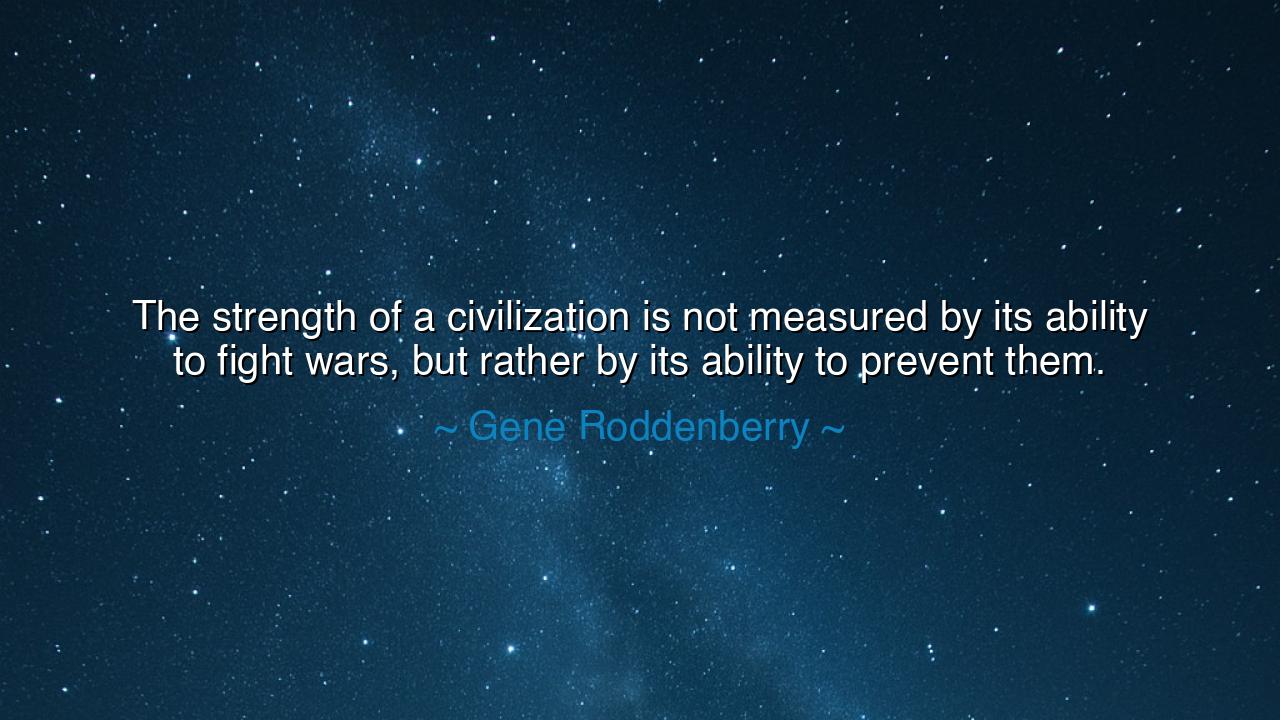
The strength of a civilization is not measured by its ability to
The strength of a civilization is not measured by its ability to fight wars, but rather by its ability to prevent them.






The visionary Gene Roddenberry, creator of Star Trek, once declared: “The strength of a civilization is not measured by its ability to fight wars, but rather by its ability to prevent them.” These words are no mere idealistic dream, but a profound truth about the nature of lasting greatness. For any nation, tribe, or people can take up arms and bathe the earth in blood. The true test, the higher calling, is to cultivate such wisdom, justice, and foresight that war itself becomes unnecessary.
To measure strength only by the sword is to mistake violence for virtue. A civilization that glories only in conquest may win battles, but it loses its soul. Rome was mighty in war, yet its endless hunger for expansion bred corruption and decay. True strength, Roddenberry teaches, is not the power to destroy, but the wisdom to preserve. It is the ability to resolve conflict without unleashing chaos, to uphold justice without slaughter, to ensure peace without tyranny.
History gives us radiant examples of this truth. Consider Ashoka the Great of India. Once a ruthless conqueror, he unleashed devastation upon Kalinga, only to be struck with remorse at the sight of death and ruin. He turned from conquest to compassion, spreading Buddhism, justice, and peace across his realm. Ashoka’s legacy was not in the battles he won, but in the wars he chose to prevent, in the harmony he cultivated among his people. His empire endures in memory not for its armies, but for its wisdom.
Roddenberry’s words were forged in the shadow of the twentieth century, when the world saw two great wars consume millions of lives. Nations measured themselves by their armies, their bombs, their ability to crush their foes. Yet in the aftermath, the survivors saw clearly: victory on the battlefield does not guarantee peace. The strength of civilization lies instead in diplomacy, in cooperation, in the courage to disarm hatred before it ignites. That was the dream behind his vision of the future — not endless battles among the stars, but the triumph of reason, tolerance, and unity.
To prevent war is not the work of cowards, but of the bravest souls. It requires patience in the face of provocation, restraint when vengeance tempts the hand, and faith in dialogue over violence. The warrior who sheathes his sword for the sake of peace shows greater mastery than the one who strikes first. For to fight is often the easy road; to prevent war is the higher, harder, nobler path.
The lesson, then, is clear: let not your pride be in how fiercely you can fight, but in how wisely you can avoid fighting at all. This truth applies not only to nations, but to individuals. In our daily lives, we are offered chances to quarrel, to clash, to wage small wars of ego and anger. But true strength is shown in patience, in understanding, in preventing the conflict before it grows. In this way, each of us can embody the higher measure of civilization.
Practical wisdom follows: when conflict threatens, pause and seek peace. Listen more than you speak. Strive to understand before you demand to be understood. Let justice guide you, not pride. Choose prevention over destruction, harmony over division. If you must fight, let it be only when all else has failed, and even then with a heavy heart, not a joyful one.
So remember, O listener, the immortal words of Gene Roddenberry: “The strength of a civilization is not measured by its ability to fight wars, but by its ability to prevent them.” Let this truth guide not only nations, but your own life. For the greatest victories are not those won by blood, but those secured by peace, and the strongest civilizations — and the strongest souls — are those who rise above war to guard the sanctity of peace.






AAdministratorAdministrator
Welcome, honored guests. Please leave a comment, we will respond soon